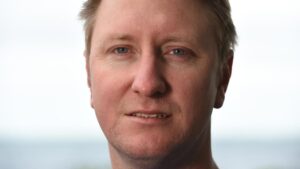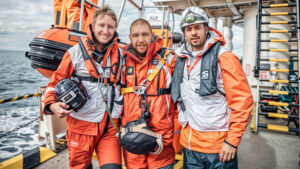“It is Busy, Loud and 24/7”
It all started with a photo. In 2015, the world was struck by shock and grief when the images capturing Alan Kurdi, a three-year-old refugee boy from Syria who drowned while trying to get to Europe, made the global front pages. For Simon Lewis, that was the turning point in his life and a beginning of a noble mission that would bring him to save hundreds of innocent lives thousands of miles away from home.
Born in Sydney, Australia in 1983, Simon Lewis has always enjoyed spending time in the ocean, both personally and professionally. Starting from his early years, he had a strong role model in his mother, always willing to take care of others: “My mother demonstrates care, compassion and dignity in her role as a nurse. Her kindness inspires and has instilled in me that all lives are valuable regardless of race, religion, creed, orientation or views.”
Simon’s lifesaving career took off on the St Kilda beach in Melbourne, Victoria, where he joined the local Lifesaving Club. Even then, he was willing to go above and beyond for people who needed his assistance. “Being on the Board of Directors at St Kilda Lifesaving Club, I worked on the accessibility project to make our beach the most accessible beach in the country of Australia – which it did become,” he recalls.
They developed a specialized water wheelchair and implemented other measures, allowing people with disabilities to experience going into the sea for the first time in their life. Simon still remembers the first woman who got to do that: “This allowed her and many others to be in the moment of witnessing the joy and gratitude of being at the beach and in the ocean, like the rest of us. Feeling like there is no limitations in their life for the first time ever was such a significant outcome.”
Simon Lewis grew up believing that the ocean should be a source of joy and happiness, not death and devastation, but he knew it was a dangerous force to be reckoned with. That is also one of the reasons why he was so deeply affected by the stories of refugees who lost their lives at sea while searching for freedom and a better life: “I knew my training and skills as a search and rescue operator and lifeguard were focused on saving lives, and I simply asked myself, “Why am I not there to help save lives?” That question led to life-changing events.”
“The distance between Australia and Europe is vast, yet with technology we are connected instantly to all countries. I witnessed the story of Alan Kurdi, a child drowned at sea, and my heart ached as the vision of his lifeless body had imprinted into my mind,” says Simon. He decided it was time to make a difference.
He applied for a position with the International Surf Lifesaving Association, which at the time was looking for experienced volunteers for its joint rescue operation in the Mediterranean sea. He was accepted into the program and sent to the Greek island of Lesbos. Due to the geographical position of the island, at the height of the refugee crisis, dozens of boats arrived there every week – and many people didn’t make it to the shore alive. Later, Simon joined forces with the SOS Méditerranée and Doctors Without Borders team and continued working in the Mediterranean.
One particular rescue has stayed with him. “I was off the coast of Libya and there was a woman, a mother, rescued from an unseaworthy boat and wearing a car tire tube as her lifejacket. She had been so scared and full of fear for hours that she was just completely exhausted when we got to her boat. Later that night, when I was on watch duties, she came to me and simply looked at me and tried to say “thank you” in English. She then placed her hand on my heart and pointed to the sky, as if to thank God. It was very powerful. Moments like that have remained with me for a long time and make me smile.”
“Knowing my limitations against the force of nature, I have to work and save people, yet I cannot risk the lives of my colleagues to be in massive waves that will endanger their lives to save a life.”
The volunteer lifesavers have had they work cut out for them, but Simon and others persevered, saving hundreds of lives. While doing that, they often put themselves in danger, too: “Knowing my limitations against the force of nature, I have to work and save people, yet I cannot risk the lives of my colleagues to be in massive waves that will endanger their lives to save a life. As the head of a mission, team leader or a crewman, situational awareness is everything, and it is such a hard call when the conditions impact the decision to say no to rescue as the risk vs the outcome is too high,” confesses Simon.
The situation becomes extremely frustrating when it’s the simplest things that stand in the way of a successful rescue operation – like the lack of financial support. “Resources are the key to successful operational goals in the field and at sea for every NGO. Money and donations matter. You need an empowerment of people who are willing to be resourced with ships and lifesaving gear to let them go to sea and make the biggest difference they can,” emphasizes Simon.
He never regretted his choice to come to Europe. In saving lives there, Simon Lewis has found his calling and a bottomless source of hope and inspiration: “Regardless of language barriers in my work, the gratitude I feel when I get to connect to another human after a rescue is beautiful. Remembering that I am part of humanity and that collectively there is a tremendous power [when we are] together as one team keeps us all going. It is busy, loud and 24/7, but on a mission, you wake up each day with a purpose and use every skill you know to change lives or try your best to commit to those out there you have not helped yet. I am grateful for having so many memories of helping change so many lives over the years.”
His humbleness does him credit, for he sees only one good thing about his unsought fame: “In modern day times, media and social media play a big part in everyone’s lives. Hopefully someone will listen, be inspired and help others. It would be a wonderful gift in a year’s time if someone writes to me and shares their humanitarian journey that started from reading mine.”
Simon believes that it’s important to remember that people who help others are not that different from the rest of us. In fact, he’s adamant that this very misconception – that those who save lives are superheroes beyond our reach – is damaging to the humanitarian cause, as there are many who’d like to help but feel they are not special or capable enough: “We can all lead by example as we contribute to causes all over the world and inspire many to become someone who makes a difference. Hero is not the term I use. We all have courage and achievements admired by others. We are not superman characters, we are just normal people who use their skills, knowledge and passion to give it our best.”



